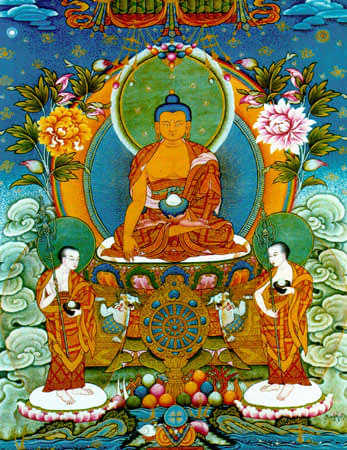Library - Tengyur - Madhyamaka

daśā-kuśala-karma-patha-deśanā
Explanation of the Way of the Ten Unwholesome Acts
I prostrate before the Three Jewels!
Since everyone desires to attain a happy existence, but is also involved by nature in the path of the ten unwholesome discarded actions, it is said here about the ten unwholesome actions, [which include] the three aspects of the actions of the body, the four aspects of the actions of speech, and the three aspects of the mind. All these I shall explain by subdividing them completely.
Among them some cut off the life from the body, take what is not given, act perversely because of desire. In speech they speak falsely, slander, [show] coarse speech and confusing words. In the mind [shows] a covetous mind, a malicious mind, and perverted vision.
Here the killing is as follows: [the object] appears as a living being, the understanding as a living being appears, the perfect approach of the killing mood appears, this method [of killing] is also carried out, and the cutting off of life appears. If one possesses these five branches, then one is killing.
What is the taking of that which is not given here? There is [something that belongs to] another, the understanding that another possesses it, also being completely in the attitude of stealing, also using this method, being in it acting [or moving]. If one possesses these five branches, it appears as taking what is not given.
Adultery because of desire [possesses] four aspects: it is not [acceptable] an object, it is not [acceptable] time, it is not [acceptable] a part of the body, and it is not [acceptable] an action towards a being.
Here, “is not [acceptable] an object” [means] holy Teaching, statue, etc., [abiding] in the bodhisattva level, acharya, preceptor, object of offerings, parents, etc., those who are close to the guru teacher.
“It is not [acceptable] time” [means] day, [time of] menstruation, pregnancy, lives short [i.e., the age of a child], is unwilling, suffers, mind suppressed by unhappiness, abides in the eight branches of [one-day] vows.
“Is not [acceptable] a part of the body” - mouth, anus, in front of a son or daughter, rear orifice, one's own hand.
“It is not [acceptable] to act toward a creature” [means] all foreign girls, [those] under the protection of the Teaching, a victorious standard or family, [those] under the protection of the king, prostitutes that are taken by others, a possessive kinswoman, an animal. Thus, because of passion, even on the basis of one's own wife, adultery will be revealed.
There “false speech” [is characterized by] [having something that] does not appear as real, is refuted on the basis of temporary [appearances] as real, is understood as distortion, fully abiding also in perverting methods [of assertion], using such a method, speaking also false words. If one possesses these five branches, one appears as false speech.
“Slander [leading to separation]” - words that separate others by virtue of the clouded mind.
“Coarse words” - fierce words that come in contact with harm to others.
“Obfuscating speech” - when one speaks of that which is not spoken [as true] because of the possession of desire or the possession of passion.
“Greedy mind” - an unbearable mindset that [manifests] passion for the things of others, might, wealth.
“Malicious mind"-[intending] to kill these living beings or [manifesting] perfect anger toward a living being. Thinking of binding [or controlling], striking, entangling.
“Perverted vision"-no generosity, no burning of gifts, no this world, no other world, no ascesis, no Brahmins, no gods, no Enlightened Blessed One, no arhat, no pratyekabuddha, no good conduct, no erroneous conduct, not fully ripening the fruit of actions that are carried out as good undertakings or erroneous actions.
The Blessed One said, “Noble one! Rely completely on the remembrance of the holy Teaching.” These paths of the ten unwholesome actions that have arisen from the Mahayana sutras are the cause of the great hell. Relying on the path of the ten unwholesome actions - a living being will fall into hell.
Thus concludes the explanation of the path of the ten unwholesome actions, compiled personally by the great acharya Dipamkara Sri Jnana. This was translated and proofread by the Indian preceptor and translator-corrector monk Tsultrim Gyalwa.
Translated by Lama Karma Paljor (Filippov O.E.).


